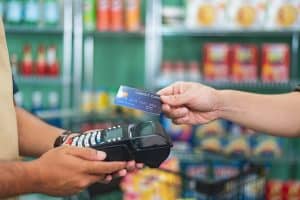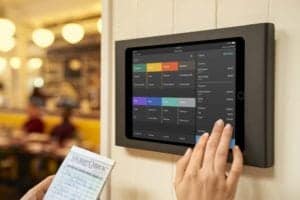Learn the differences between a POS system versus a cash register and how to determine which is better for your small business.
Our content reflects the editorial opinions of our experts. While our site makes money through
referral partnerships, we only partner with companies that meet our standards for quality, as outlined in our independent
rating and scoring system.
When it comes to choosing the right point of sale system for your business, you might be considering the debate between a POS (point of sale) system versus a traditional cash register, especially if the cost of a POS system is a concern for you.
If this is your current small business concern, read on to discover which might be the best fit for you.
POS VS Cash Register: The Key Differences
|
Cash Register |
POS System |
| Pricing |
A cash register can be purchased for around $100 to $1,500+. No monthly subscription fees are required to use a cash register. |
Basic POS software starts at $0. More advanced software may cost as much as $100+/month. Hardware costs range from free for a basic card reader to $1,000+ for a full setup that may include equipment like multiple terminals, customer-facing displays, kitchen displays, and barcode scanners. |
| Payment Methods |
A cash register can be used to accept cash payments. Standalone equipment will be required to accept cards and other forms of payment. |
POS systems can be used to accept cash, credit cards, debit cards, and contactless payment methods, such as Apple Pay. |
| Multilocation Management |
Cash registers do not sync with other cash registers and are not ideal for businesses with multiple locations and/or registers. |
Many POS systems can be synced across multiple terminals or locations. |
| Reporting |
Daily sales can be calculated with a cash register. |
POS systems have more advanced reporting. This may include detailed sales reports, cash flow analysis, employee reports, and more. |
| Additional Features |
Cash registers are useful for calculating and accepting cash payments. No additional features are available. |
POS systems may include many unique features, including employee management, time tracking, inventory tracking, and more. |
| Integrations |
Cash registers do not have built-in integrations. |
POS systems may integrate with other software and apps, such as accounting software, employee management software, or inventory management software. |
| Ease Of Use |
Cash registers are easy to use and require little training. |
POS systems may be a bit more difficult to use, but there are several user-friendly features available. Additionally, many POS providers offer numerous resources and customer support to help install, implement, and use your new system. |
Cash registers may be a great choice for cash-only businesses that want a simple way to accept payments.
However, a POS system is better suited for businesses that want to accept multiple forms of payment, run in-depth reports, and launch customer loyalty programs. If you’re undecided on which is best for your business, check out the key differences between POS systems and cash registers in the table above.
Another thing to think about is mobility. A cash register is a fixed piece of equipment that stays in one place, while many POS systems offer mobile options that allow you to use tablets, smartphones, or other small devices that easily move around your business. You can learn more about mobile POS options in our guide to mPOS systems and software.
Point Of Sale VS Cash Register
If you’re unsure whether a POS system or cash register is the best choice for your business, consider the following.
Choose A POS System If You Are…
- A business that needs detailed sales, inventory, and employee reports
- A business that wants to sync multiple terminals in one or more locations
- A business that wants to track and manage inventory
- A business that wants advanced tools, including employee management, marketing, customer loyalty, and gift card programs
A POS system is a computerized system utilizing a combination of software and hardware to perform various functions beyond just ringing up a sale.
Features
A POS register system comes with a variety of software features, but some may have an additional fee. POS business tools may consist of:
Pricing
POS pricing varies widely based on the equipment and features you use. But if you’re on a budget, don’t worry — there are some great free POS systems and apps on the market. You can even get a basic card reader for less than $100 or take advantage of Square’s free card reader to start.
A basic POS setup can be low-cost, but pricing can start to creep up fast as you add on additional features or equipment. For example, your setup may include the following equipment:
- Customer-facing display
- NFC mobile wallet reader
- Barcode scanner
- Tablet stand
- Kitchen display system (KDS)
- Cash drawer
- Scales
- Additional tablets for mobile or wait staff
Generally, you can purchase a hardware package of essentials for around $700. You may be able to save some money with bundled hardware deals or special discounts, so shop around. You can also save on upfront costs by taking advantage of financing options offered by some POS providers.
When it comes to identifying the best option, compare long-term and short-term costs, and be very cautious with long-term contract agreements. Before you commit to an annual contract with a POS system (even if it saves you money), test it out on a month-to-month basis to ensure the software is right for you. Most POS companies offer free trials.
Pros & Cons Of A POS System
A POS system is an all-in-one solution that’s designed to simplify the way you run your business. An easy-to-use POS system can also help take some of the workload off of your employees. These systems can also be used to run vital reports to assess the health of your business and may even boast features to help you better serve your customers.
Pros:
- All-in-one solution
- Numerous features, integrations, and business tools
- Advanced reporting
- Multiple location management
Cons:
- May be expensive for small businesses
- May have ongoing fees for features and hardware
- Some POS systems are difficult to learn and use
Want to learn more? Our article on the benefits of a POS system for your small business is a good place to start.
Choose A Cash Register If You Are…
- A business that wants an inexpensive and simple way to accept payments from customers
- A business that primarily accepts cash payments
- A business that wants an easy-to-use device that requires little or no training
A cash register is an electronic, non-computerized device that has one primary function — recording a sale and collecting cash. A cash register can also include a receipt printer, barcode scanner, and a cash drawer to hold money. Some of the specific features, such as product library capacity or issuing unique ID codes for your operators, may vary.
Features
It’s safe to say that a traditional cash register is a relatively simple piece of equipment, and while a workhorse when it comes to tallying a sale, that’s all you can expect.
Cash registers can truly have as many features as a basic calculator and not be attached to your cash drawer. They can also be as advanced as large, semi-permanent computers connected to locked cash drawers, barcode scanners, card readers, and more.
The more advanced cash registers are going to cost a lot more than a basic unit.
Pricing
A cash register doesn’t have pricing structures that are as complicated as POS systems.
You can purchase a basic cash register without the bells and whistles for around $200 or less. If you have a low-volume business that mostly accepts cash payments, this could work for you. There are also more expensive versions with features such as touchscreen monitors that could run you $1,500 or more.
In most cases, you’ll find that a cash register is less expensive than a POS system.
Pros & Cons Of A Cash Register
If both simplicity and low cost are what you are after, a cash register is a great option. You can purchase one for a few hundred dollars and start ringing up your sales. If you are looking for more integration and control, however, a POS system may be the better fit.
Pros:
- Inexpensive
- No ongoing costs
- Simple to use and easy to train new employees
Cons:
- Requires additional hardware to accept payments other than cash
- Not suitable for multiple locations
- No advanced reporting
- No business tools, additional features, or integrations
POS Cash Register Combinations
What if the right option for your business is “both”?
Most POS providers have some sort of cash register POS combination. At the very least, most offer a cash drawer, tablet, and receipt printer.
Square’s point of sale system offers hardware cash register POS kits like the Square Register Kit that comes with a Square Register, cash drawer, and receipt printer with a starter paper roll starting at $1,269 (or $62 per month with financing).
Clover’s Station Solo cash register POS kit comes with a 14″ touch screen, cash drawer, and receipt printer for $1,699 (or $125 per month for 36 months).
Some POS providers, like Lightspeed Retail, offer cash register POS kits for a custom price. You can contact Lightspeed’s customer support team to learn more about pricing for the iPad point of sale hardware kit (receipt printer, cash drawer, Bluetooth scanner, and iPad stand) or desktop hardware kit (USB receipt printer, cash drawer, and USB scanner).
Our complete guide to POS hardware can help you decide what you need for your business and what you can forgo as you build your perfect POS cash register combination.
POS VS Cash Register: Final Thoughts
If you plan to primarily accept cash payments, don’t have a lot of inventory, or have a small budget, you can certainly manage to get by with a cash register.
You won’t get the advanced sales reporting, customer reporting, or other features that you get with a POS system. The data you glean from tracking product sales can be invaluable when it comes time to plan and market, so keep in mind what you can gain from a POS.
If you plan to accept cash and credit cards, it’s worth having a POS system that can combine reporting for both cash and card sales — as well as all the other features you get with a POS system. You will incur added costs with this solution, but remember that you have options here, too.











